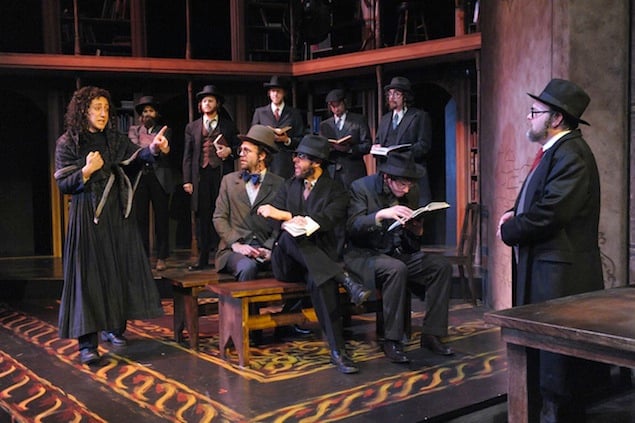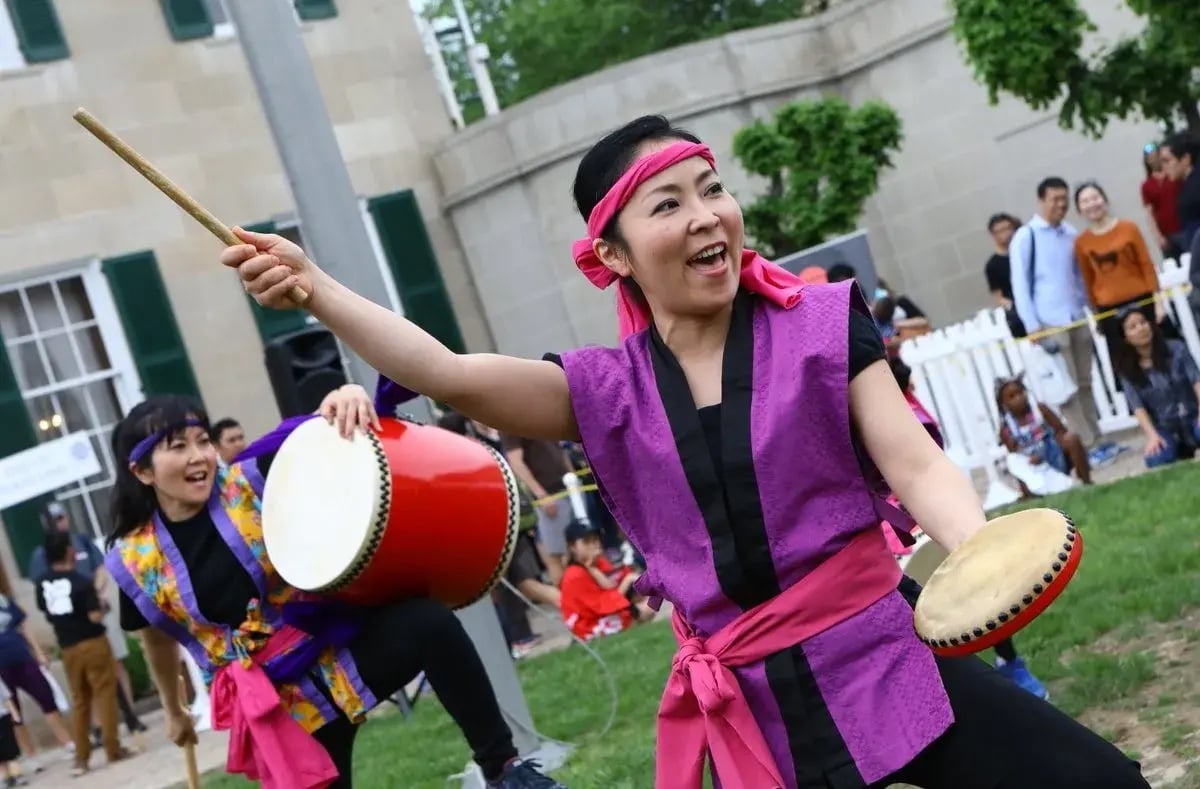If Yentl had a formula, it would go something like this: two parts Twelfth Night plus one part Boys Don’t Cry, with a generous pinch of Fiddler on the Roof.
Still with me? Good—because while the play, currently at Theater J, has elements of all three of those works, it adds up to something wholly, and entertainingly, different.
Yentl is based on the short story “Yentl the Yeshiva Boy” by Isaac Bashevis Singer, first published in English in 1983 and adapted the same year into an Oscar-winning film starring Barbra Streisand and Mandy Patinkin—though with a notable departure from the ending of the original work. Theater J’s production, directed by Shirley Serotsky, more closely follows Singer’s conclusion, and adds a musical element with original songs by Jill Sobule and Robin Eaton.
Yentl (Shayna Blass) is a smart, motherless girl who wants to study the Torah like her father (Jesse Terrill), who despairs at her refusal to be married off. When her father dies, Yentl disguises herself as a boy, calls herself Anshel, and sets off to find a quiet yeshiva where she can study in peace. Along the way, Anshel meets Avigdor (Michael Kevin Darnall), who takes the young scholar under his wing, and the two soon become best friends. Though teased by the other men for his prudishness (he refuses to visit the swimming hole or spy on women bathing) and the object of much curiosity from the village girls, Anshel hides his true nature fairly well—until Avigdor tells him the story of his ex-fiancée, Hadass (Sara Dabney Tisdale), whose family suddenly broke off their engagement, and Anshel decides to avenge his friend by marrying Hadass himself, throwing his new life of academic bliss into doubt.
Blass captivates in the title role, playing the character’s fiery conviction and frustrated confusion with equal panache; she manages to be utterly convincing even when Yentl herself doesn’t know what the hell she’s doing. She also has a powerful voice, though she doesn’t get to use it as much as one would hope. Which brings us to one of the more confusing elements of the production: This is not exactly a musical, though the characters do perform musical numbers. Rather, the cast members double as musicians and break into song during scene transitions, which in several places serves to distract from the emotional impact of the action. Same for the choreography, which is sporadic; the production might be better served as either a straight drama or a full-on musical, but as is, things feel a bit muddled.
Perhaps that’s fitting, though, for a play about gender confusion. Yentl’s purpose at first seems straightforward—she wants to study, not be “someone’s footstool,” as she tells her father early on—but as her relationship with both Avigdor and Hadass deepens, she struggles to reconcile her simple human desires with her pursuit of a higher calling.
Humor, including in the form of tongue-in-cheek sexual innuendoes and irreverent musical numbers—such as “Oh, Sh*t,” which Yentl sings as she realizes just how deep a hole she’s dug herself—add necessary levity to what could be a too-heavy exploration of restrictive religious tradition and the historical marginalization of women. Robbie Hayes’s two-story set is gorgeously detailed, and the cast does a lot with a couple of wooden benches and tables. Serotsky also does a lot with her cast—with the exception of Blass, each actor embodies several different role, and there are some very fine performances. Darnall nails the charm and intelligence that make Avigdor so magnetic to the young Anshel. Tisdale’s Hadass has the right mix of naiveté and stubbornness, though her motives are harder to parse: She must suspect something about Anshel doesn’t quite add up, though she seems nothing if not a devoted wife throughout. (In that regard, she serves as an illustration of what Yentl’s fate could have been, had she not taken extreme measures to remain in control of it herself.)
The play’s conclusion is a bit too easy in some ways, though refreshingly it refuses to hand over a pat rom-com ending for the convention-defying heroine. Yentl/Anshel may be able to find her way eventually, but as the bittersweet final moments suggest, it won’t be an easy path to follow.
Yentl is at Theater J through October 5. Running time is about two hours and 30 minutes, with one intermission. The production contains some nudity. Tickets ($30 to $45) are available through the theater’s website. Find Tanya Pai on Twitter at @tanyapai.

















